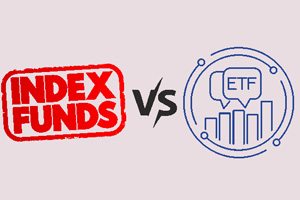Have you heard of the term passive income? If yes, do you know what it means? Passive income is money that you accumulate without actually working for it, unlike your job salary, which is a form of active income. Multiple financial legends have emphasised upon the importance of passive income, with Warren Buffett famously stating that if you don’t find a way to make money while you sleep, you will work until you die. If you are keen on attaining financial freedom, passive income is imperative to the equation and the stock market offers you two excellent avenues to make money while you sleep – via exchange traded funds and index funds. And now we must consider the question of ETF vs index fund – the best option for your requirements.
What are ETFs?
To clarify the question of ETF vs index fund, here is a primer on the former. ETFs are investment funds that trade on stock exchanges, similar to individual stocks. They track the performance of a specific index, sector, commodity, or asset class and offer investors a way to gain exposure to a diversified portfolio of securities without directly owning the underlying assets. While ETFs do share many similarities with index funds, these are not mutual fund schemes and can be bought and sold throughout the trading day, at market prices, just like a stock. Today, the market offers you access to various types of ETFs such as index-based ETFs, debt and commodity ETFs and even actively managed ETFs, wherein fund managers actively buy and sell securities to achieve their investment objectives.
What are index funds?
Now that you know what ETFs are, let us understand the concept of index funds. This will help you better analyse the difference between ETF and index fund. These are passive equity funds which aim to replicate the performance of a specific market index or benchmark, with popular ones tracking major benchmarks like the Nifty 50 or the S&P 500. These mutual funds are designed to provide investors with broad market exposure, as they hold a diversified portfolio of stocks or bonds that mirror the composition and weighting of the underlying index. They have gained popularity among both individual and institutional investors as a core component of a well-rounded investment portfolio.
Index vs ETF comparison
There are a variety of factors which call for the question of exchange traded funds vs index funds, and these are as under –
- Fund management: While index funds are solely passively managed schemes, ETFs can fall under both the active and passive management categories. This means that active ETFs will have full-fledged asset management teams in place, leading to a higher expense ratio, Therefore, if you are keen on a passive management strategy, you should pick a passive ETF or index fund.
- Trading style and strategy: As we have seen, index funds are mutual funds while ETFs are more similar to stocks, in that these are traded on exchanges throughout the day. However, you can only buy or sell index fund units at the fixed price which is published at the fag-end of the trading day. You can invest in ETFs through a trading and dematerialised account or invest in index funds through your asset management company or an online investment platform.
- Expense ratio: While both the ETF and index fund offers lower expense ratio than active funds, most passive ETFs are cheaper than index funds. However, ETFs do have a few extra costs hidden under the fold, such as broker’s commissions and the bid-ask spread, i.e., the difference between the seller’s price and the buyer’s price.
- Liquidity: An index fund is floated by asset management companies and your contribution is added to the investment corpus pooled by other participants. This makes index funds extremely liquid and enables you to withdraw your investment without any hassles. On the other hand, when you purchase an ETF, you are making a commitment like the one you make in stock purchases and some ETFs can end up being illiquid amid low demand. Unless you have a buyer on the other end, you will not be able to redeem your ETF share.
- Investment mode: While index funds allow you to invest by way of systematic investment plans, and enjoy the benefits of compounding and rupee cost averaging, ETFs, which function like stocks, do not usually have an SIP option available. Therefore, you will have to invest solely via the lumpsum route or systematically invest regularly as per your own judgement, which may be difficult if you are someone keen on monthly investments.
What should you choose?
As you can see, both these options have their advantage and disadvantages for passive investors. You can pick the best option for yourself by ascertaining your investment goals. In case you are a long-term investor keen on the SIP route, then index funds can be an interesting option. Alternatively, if you wish to capitalise on market fluctuations, then ETFs could be the preferred route.
If you are still debating whether or not to start passive investments, heed the words of business trainer and author T. Harv Eker, who said, “You can only be financially free when your passive income exceeds your expenses.”
An investor education initiative by Edelweiss Mutual Fund
All Mutual Fund Investors have to go through a one-time KYC process. Investors should deal only with Registered Mutual Fund (RMF). For more info on KYC, RMF and procedure to lodge/redress any complaints, visit - https://www.edelweissmf.com/kyc-norms
MUTUAL FUND INVESTMENTS ARE SUBJECT TO MARKET RISKS. READ ALL SCHEME RELATED DOCUMENTS CAREFULLY
Trending Articles
MUTUAL FUND INVESTMENTS ARE SUBJECT TO MARKET RISKS, READ ALL SCHEME RELATED DOCUMENTS CAREFULLY.




















